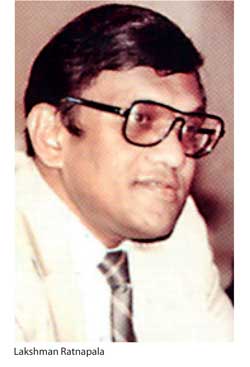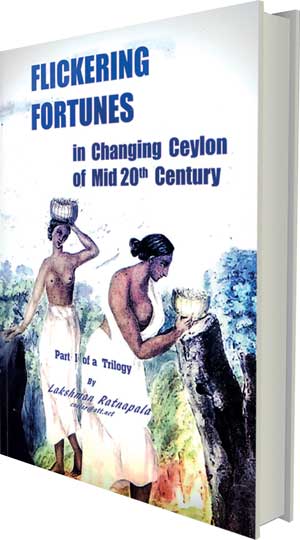Reply To:
Name - Reply Comment

An excerpt of a speech delivered by Rev. Marc Billimoria, Warden of St. Thomas’ College, Mount Lavinia on the release of the book; Part I of a Trilogy ‘Flickering Fortunes in changing Ceylon of Mid 20th Century’ by Lakshman Ratnapala.

I consider it a great privilege and an honour to make this brief presentation on the occasion of the release of Volume 1 of his reflections by Lakshman Ratnapala, a distinguished alumnus of St. Thomas’ College, Mt. Lavinia. I am particularly glad to be able to do so because I had to decline his invitation to write a pre publication review due to time constraints.
I am an avid fan of biographies, memoirs and autobiographies. This is why when Lakshman Ratnapala invited me to be part of this event and speak on Volume 1 of his “Flickering Fortunes” I was happy to accept his kind invitation. I have not had the pleasure of meeting him personally and have thus far only communicated via email, since 2014, when he donated a substantial part of his valuable collection of books to the STC Library where we now have a Ratnapala Collection in the reference section for our boys to make use of. We are very grateful to him for his generous gift.
In perusing Volume 1 of Lakshman Ratnapala’s book I found that it contained the three essential ingredients of a good memoir: entertainment, inspiration and insight.

The story of his life from his beginnings at Ali Gedera to his migration of sorts to ‘the land of the free and the home of the brave’ is full of humorous anecdote, insights and musings on questions of life that prompt the reader to want to keep on reading. One can learn about family and village life in days gone by and old fashioned family values that today seem anachronistic and outdated but in that day and age were the backbone of family, society and community in Sri Lanka. We are also given snapshots of the beauty of Sri Lanka’s natural environment, terrain and wildlife.The reader is offered an introduction to the political culture of Sri Lanka in years gone by and to the ins and outs of that noble profession the Ceylon Civil Service.
It is so clear that both the political arena and the administrative service have changed over the years and decades that Lakshman has lived and worked. The great statesmen and the giants of the civil service referred to as ‘Mandarins’ in the book evoke in us a sense of the nature of political change that has gripped our nation over the past 50 years. Lakshman spares no one, suffers no fools and pulls no punches in the forthright manner with which he chronicles the life and times of Sri Lanka.
I was particularly inspired by the references to the men of integrity like his father who strode the political and administrative stage at a time when merit and integrity were the qualities that ensured advancement and success -- ‘what you know’ and not ‘who you know!’ Integrity, that extremely valuable commodity in a person’s character that earns respect like nothing else can and that cannot be bought for any price.
The world of journalism in Sri Lanka that was dominated by newspaper publishing houses of great repute is also well described as are the tumultuous events that took place from time to time in post independence Sri Lanka that have contributed to the present woes of our island nation.
A description of the familial and social systems offer us an insight into what society was like in days gone by. There are elements of the family memoir genre in the book that read like any one of the biographies of the great families of Sr Lanka. Their fascinating lifestyles, the way they lived, the way they were educated, how marriages took place etc are all explained in a well crafted way. For instance, I learned for the first time of the three forms of marriage in the Sinhalese community: the deega marriage, the binna marriage and the common law marriage. The rituals of the various rites of passage also make very interesting and enlightening reading.
The stress on the roots of his paternal and maternal families is proof enough that Lakshman Ratnapala has not fallen prey to what the 18th century English orator, author and political theorist Edmund Burke described in this way, as quoted by the author, ‘people will not look forward to posterity who never look backward to their ancestors.’ As a student of history myself, I am deeply gratified by the author’s emphasis on his roots for we ignore our roots to our detriment. The historian George Santayana has written that ‘those who do not know their history are condemned to repeat it.’ History of our national life and that of other nations proves time and time again that this is true. We ignore our past to our detriment and Lakshman in this book has helped in his own small way to help us remember the past.
I mentioned at the outset that Lakshman Ratnapala is a distinguished product of St. Thomas’ College, Mount Lavinia. His reminiscences of his experiences at STC are particularly poignant for me as I serve as its present Warden. I must confess that when I received the soft copy of the book by email, I skipped straight to the chapters that dealt with his years as a Thomian and what a veritable treasure trove of facts and insights I found therein. STC can be justly proud that in her 165 year history of existence, we have produced men of the calibre of Lakshman Ratnapala. Men of integrity and of a quality that have impacted society both in this country and abroad.
He had joined STC in 1945 when the College was scattered all over the island due to the takeover of the Mt. Lavinia campus by the army as a military hospital. He attended the branch that was for a time housed down the road from that campus at Girls’ High School, under famous masters and teachers such as the Rev. J. Y. Barnabas and the legendary Miss Agnes Bay. His Warden was that colossus among educationists Canon R. S. de Saram who presided over the destinies of the School for 26 years before retiring in 1958. Warden de Saram in one of his last speeches to the school boys of the day, that included young Lakshman Ratnapala, spoke some words that have had a lasting impression on him: ‘Do your best in the classroom and in your games, but above all in the ways you conduct yourselves, and in the ideals you set before yourselves. There is much that is vulgar, cheap and tawdry, loud and raucous in contemporary ideals. You came to a school like this to get a right judgement on these matters.’ Times may have changed from 1958 to today but the ideals are the same and the vision for education at St. Thomas’ remains the same. The description of his life and times at STC are very valuable for us who are involved in forming the present generation of Thomians who have inherited the tradition that Lakshman Ratnapala and his contemporaries inherited from those who went before them. Long may this tradition remain and bare fruit. He ends the chapter on his days at STC with some very poignant words that I would like to quote: ‘The values that I uphold in life were shaped by my family. However, it was this school that moulded my character. It was here that I adopted the motto by which I have lived: DO THE RIGHT THING.’ How wonderfully inspiring.
The addenda of the memoir contains some essential writings and musings of the author that provide an insight into his mind and world view. They make for very interesting and stimulating reading.
All in all, for me this collection of reflections on the life of a family and a country through the telling of his own life story, has taken me on a fascinating journey into the recent history of this resplendent isle, our Mother Lanka.
I am grateful to the author for the labour of love that is before us today, and can honestly say I am looking forward to reading the next two volumes.